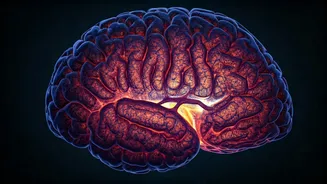Initial Symptoms: Fatigue
One of the earliest and most prevalent signs of Vitamin B12 deficiency is persistent fatigue. This tiredness often goes beyond the usual tiredness that
occurs after a long day; it's a profound, overwhelming exhaustion that doesn't alleviate with rest. The deficiency impairs the body's ability to create red blood cells, which are critical for carrying oxygen to cells and tissues. Without enough oxygen, the body struggles to generate energy efficiently, leading to persistent and often debilitating fatigue. This can significantly impact daily activities and reduce overall quality of life. The severity of fatigue can vary depending on the degree of the deficiency, from mild tiredness to profound lethargy that makes it difficult to function.
Mental & Mood Changes
Vitamin B12 plays a crucial role in maintaining mental health and cognitive function, making its deficiency linked to a variety of psychological and emotional problems. Many people with low B12 levels may experience mood swings, depression, and irritability. Vitamin B12 is essential for producing neurotransmitters like serotonin and dopamine, which regulate mood. Consequently, a shortage of B12 can disrupt these neurotransmitter pathways, leading to emotional instability. Cognitive impairments, such as difficulty concentrating, memory problems, and brain fog, are also common. These cognitive challenges often lead to a misdiagnosis, as they resemble symptoms of depression or age-related cognitive decline.
Neurological Manifestations
A Vitamin B12 deficiency can also significantly affect the nervous system, potentially leading to a range of neurological symptoms. These can include tingling or numbness in the hands and feet, known as peripheral neuropathy, which results from nerve damage. Balance issues and problems with coordination may also arise, making walking and other physical activities challenging. Severe deficiencies may lead to more serious neurological problems like cognitive impairment, dementia, and even psychosis. These neurological signs can develop gradually, making them easy to overlook or misattribute to other health conditions. This highlights the importance of early detection and intervention through proper diagnosis and treatment.
Digestive Distress Alert
Vitamin B12 deficiency can often disrupt digestive health, leading to several gastrointestinal issues. One of the most common is a loss of appetite, where the body's desire for food diminishes. This can then lead to unintended weight loss and a decrease in overall nutrient intake. Diarrhea or constipation may also occur. Prolonged B12 deficiency can also lead to more serious issues like atrophic gastritis, where the stomach lining becomes damaged. This condition can affect the absorption of nutrients, including B12, perpetuating the deficiency cycle. The digestive system is intrinsically linked with the absorption of Vitamin B12; therefore, any disturbances can significantly affect the body's ability to maintain healthy B12 levels.
Skin & Mouth Clues
Vitamin B12 deficiency can also manifest through visible changes in the skin and mouth. Individuals might notice a pale or yellowish tinge to the skin, which indicates anemia, a common result of B12 deficiency. A sore and inflamed tongue, known as glossitis, is another prominent sign, and can make eating and speaking uncomfortable. Mouth ulcers may also develop. The appearance of these physical symptoms can provide clues to an underlying B12 deficiency. Recognizing these outward signs is essential in prompting a thorough medical assessment. These changes are a crucial warning to those experiencing any of the related symptoms to seek medical consultation and start appropriate testing to check for underlying deficiencies.
Anemia & B12 Connection
A significant consequence of Vitamin B12 deficiency is the development of anemia. B12 is crucial for producing healthy red blood cells; its shortage leads to the production of abnormally large, immature red blood cells. These cells cannot function correctly, leading to reduced oxygen transport and symptoms of anemia. The signs include fatigue, weakness, and shortness of breath. Anemia that is caused by B12 deficiency is known as pernicious anemia. It requires specific treatment, often involving B12 injections or high-dose oral supplements. Recognizing the symptoms of anemia and having a proper blood test can help to determine the presence of a B12 deficiency, enabling timely intervention and preventing any lasting health effects.
Who's at Risk?
Certain groups are at a higher risk of Vitamin B12 deficiency. Older adults are susceptible due to reduced stomach acid production, which is necessary for absorbing B12. Vegetarians and vegans face increased risk because B12 is primarily found in animal products. Individuals with gastrointestinal disorders like Crohn's disease or celiac disease may have impaired nutrient absorption, increasing the likelihood of deficiency. Those who have undergone weight loss surgery, or who regularly take medications that reduce stomach acid, are also prone to B12 deficiencies. Understanding these risk factors is vital for anyone who suspects they might be in a vulnerable group, encouraging them to take preventive measures like supplementation or regular blood tests.
Diagnosis & Testing
Diagnosing a Vitamin B12 deficiency typically involves a combination of assessing symptoms and performing blood tests. A complete blood count (CBC) can reveal anemia. The most common test directly measures the level of B12 in the blood. If this level is low, additional tests may be conducted. These can include tests for methylmalonic acid (MMA) and homocysteine levels. Elevated levels of these indicate a B12 deficiency, even if the B12 level itself is in the normal range. In some cases, a Schilling test may be used to assess the body's ability to absorb B12. Early and accurate diagnosis is essential for the effectiveness of treatment, as it is a crucial step towards preventing long-term complications.
Treatment Options Explored
Treatment for Vitamin B12 deficiency primarily involves B12 supplementation. The specific method depends on the severity of the deficiency and its underlying cause. B12 injections, administered intramuscularly, are the most common initial treatment. These bypass the digestive system, ensuring effective absorption. Oral supplements are an option for mild deficiencies, though absorption can vary. High doses of oral B12 are often needed to overcome any absorption issues. Dietary changes play a significant role. Incorporating B12-rich foods into the diet, such as meat, fish, eggs, and dairy products, is crucial, especially for individuals at risk. Regular monitoring and follow-up blood tests are necessary to ensure B12 levels are restored and maintained, preventing the recurrence of symptoms.
Prevention & Management
Preventing Vitamin B12 deficiency involves a multi-pronged approach. Individuals should focus on consuming B12-rich foods or consider taking supplements, especially if they are at risk. Regular check-ups are essential, especially for individuals with risk factors, which can identify deficiencies early. Monitoring B12 levels through routine blood tests allows prompt intervention if necessary. Addressing underlying medical conditions that affect B12 absorption, like digestive disorders, is also crucial. Lifestyle adjustments, like dietary changes, can prevent deficiencies. For those with certain health conditions or dietary restrictions, consulting with a healthcare professional or a registered dietician is critical for developing a personalized plan to maintain optimum B12 levels and overall health.



















